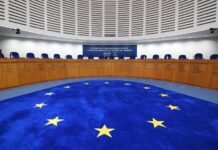Turkish President Recep Tayyip Erdoğan’s May 14 election campaign is based solely on claims that the opposition is collaborating with terrorists and will grant rights to LGBT people, Nordic Monitor reported.
According to Nordic Monitor, However, neither Erdoğan’s strongest opponent, Kemal Kılıçdaroğlu, nor the nationalist and Islamist parties that are in the Nation Alliance (Millet İttifakı) supporting him, have made any promises or statements regarding LGBT rights. Erdoğan is trying to win back the conservative and nationalist voters who are no longer thinking of voting for him in a country where the economy is getting worse.
At every election rally, without exception, Erdoğan claims that the opposition will expand freedoms for LGBT individuals. However, there is no promise or reference to LGBT rights in a February memorandum in which the alliance declared what they will do when they win the election.
In Giresun, a city in the north of Turkey, where Erdoğan held an election rally Thursday, he said, “We are not LGBT people. The CHP [Republican People’s Party] is LGBT; the İYİ Party [nationalist Good Party] is LGBT; and the HDP [pro-Kurdish Peoples’ Democratic Party] is LGBT. Have you ever heard parties in the alliance say they’re against LGBT? We’re against it because to us the family is sacred.”
At a crowded Izmir rally last week, Erdogan said, ”This nation’s institution of the family is strong. There are no LGBT people from this nation.”
During his visit in March to the region that was hit by devastating twin earthquakes on February 6 Erdoğan told his supporters that “they are against our sacred family structure. This is why May 14 is very important. May 14 will be the day to teach LGBT people a lesson.”
No doubt, the person who propagandizes the ruling party’s opposition to the LGBT community the most is Interior Minister Süleyman Soylu. Soylu claims during every election rally that the opposition will legalize same-sex marriage. Soylu, however, does not explain on what basis he is making this assertion.
Claiming that a haircare product advertisement contains alleged lesbian messages, Soylu announced on Tuesday that he had called the minister of commerce and that the advertisement would be banned.
On April 27 Soylu said at a rally, “We will decide whether a man should be able to marry a man and if a woman can marry a woman,” regarding the presidential election on May 14.
Meanwhile, Soylu’s calling the male presenter “my sweetheart” during a TV show he appeared on Wednesday on Habertürk TV was mocked on social media.
Many observers think that Erdoğan’s anti-LGBT campaign was inspired by Hungarian Prime Minister Viktor Orbán’s 2022 election campaign. The Orbán government decided that an anti-LGBT law passed in parliament would be voted on by the public the same day as the country’s general election, on April 3, 2022 A four-question referendum ballot on family, child protection and LGBT issues was put to the voters. The referendum was deemed invalid since less than 50 percent of the voters answered the questions.
The Orbán government previously changed the definition of family with a constitutional amendment, banning same-sex couples from adopting children.
In January the Duma, Russia’s lower house of parliament, unanimously voted to extend its ban on so-called “gay propaganda.” Under the latest version of the law, any promotion of homosexuality — including in books, films and online — is illegal and carries heavy penalties. It was approved by 397 votes to none in the Duma with no abstentions.
The New Welfare Party, with which Erdoğan has cooperated for the May 14 elections, put forward conditions such as the closure of LGBT associations, a series of changes in favor of men in the laws on fighting violence against women and party leader Fatih Erbakan announced in March that they had agreed to support Erdogan after these demands were accepted.
Pro-LGBT groups often bring a liberal statement previously made by Erdoğan. Replying to a question at a meeting with young people in 2002, Erdogan had said, “Homosexuals must also be legally secure within the framework of their own rights and freedoms. We do not find their treatment to be humane.”















